|
|
Weest Paraat De Padvinderij (deel 2) |
|
|
|
|
Persoonlijke herinneringen: Eenmaal per jaar was er een actie waarbij de padvinders allerlei klusjes deden voor hun buurtgenoten om geld in te zamelen. Deze actie heette 'Een heitje voor een karweitje'. Een heitje was een kwartje, vijfentwintig cent. Soms moest je schoenen poetsen, een afwas doen of een boodschapje halen bij de kruidenier, maar er waren ook mensen die je voor dat heitje schaamteloos een hele middag hun hele tuin lieten opruimen. Ik herinner mij St. Jorisdag. Eén keer in het jaar kwamen alle padvindersgroepen uit de omgeving ’s morgens in alle vroegte, bij elkaar in de Burcht in Leiden, voornamelijk nog een cirkelvormige kasteelmuur op een heuvel midden in de stad. Daar stonden wij in het gelid opgesteld, hezen de vlag en hoorden ieder jaar weer het verhaal van Sint Joris Die De Draak Versloeg, de draak die het kwaad in de wereld vertegenwoordigde. Van ons werd verwacht dat wij hetzelfde deden, al moesten wij, vanwege een nijpend gebrek aan draken in die tijd, het kwaad op een andere manier te lijf gaan. We kregen ook een rode tulp uitgereikt die wij de hele dag moesten dragen, vastgespeld op ons hemd. We gingen die dag dus met uniform en tulp naar school. Ik weet nog dat ik mij nauwelijks durfde te bewegen uit angst dat de tulp zou knakken of zijn blaadjes zou verliezen. 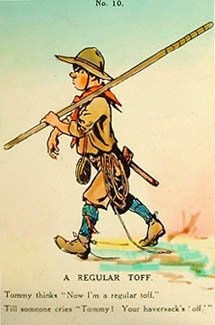 Het padvindersuniform kon worden versierd met insignes. Die kreeg je niet zomaar, die moest je behalen. Tijdens een zomerkamp ging ik voor het insigne houthakker. Ik hakte dermate mis dat het litteken in mijn linkervoet nu nog goed te zien is. 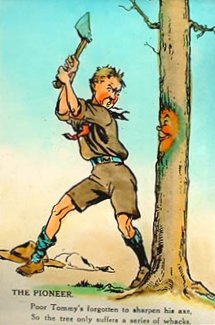 Ook behaalde ik het insigne verzamelaar. Ik beduvelde de boel. Met de postzegelverzameling van mijn vader toog ik naar het huis van de hopman. Mijn vader ging mee, waarschijnlijk deels omdat hij niet wilde dat de hopman stiekem een van zijn zegeltjes zou inpikken, deels omdat hij het toch niet helemaal vertrouwde, zijn zoon op visite bij zo’n oude man in kortlange broek. Ik kreeg, dus volkomen onterecht, mijn insigne verzamelaar uitgereikt, want de verzameling waar ik mee pronkte, was niet de mijne. Ach, ik heb het vele jaren later nog goedgemaakt toen ik toch nog echt een keer met verzamelen begon. Postzegels konden mij niet boeien. Daarom verzamel ik nu...... toverlantaarns….! |
18. A Cautious
Advance. If you are stalking an enemy (I hope you'll never
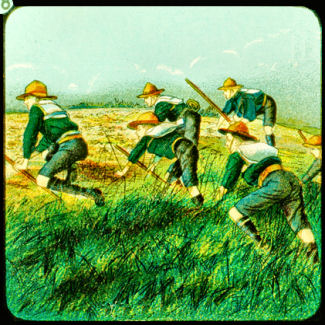 have to do anything of the kind) or a wild
animal, or advancing towards an opposing patrol, and do not want to be seen, this is the way to do it:
"Advance cautiously." Remember the example of the Zulu Scout. If he is
making use of a hill-top or rising ground as a look-out place, he will crawl
up on all fours, lying flat in the grass; on reaching the summit he will
very slowly raise his head till he can see the view. If he sees the enemy
beyond, he will have a good look at them, and, if he thinks they are
watching him, will keep his head perfectly steady for a long time, hoping
that he will be mistaken for a stump or a stone. Any quick or sudden
movement of the head on the sky-line would be very liable to attract
attention, even at a considerable distance.
have to do anything of the kind) or a wild
animal, or advancing towards an opposing patrol, and do not want to be seen, this is the way to do it:
"Advance cautiously." Remember the example of the Zulu Scout. If he is
making use of a hill-top or rising ground as a look-out place, he will crawl
up on all fours, lying flat in the grass; on reaching the summit he will
very slowly raise his head till he can see the view. If he sees the enemy
beyond, he will have a good look at them, and, if he thinks they are
watching him, will keep his head perfectly steady for a long time, hoping
that he will be mistaken for a stump or a stone. Any quick or sudden
movement of the head on the sky-line would be very liable to attract
attention, even at a considerable distance. |
19. A Prisoner brought into Camp. A
favourite exercise among the Scouts is connected with the sending of
despatches and the endeavour to capture the despatch-runner.
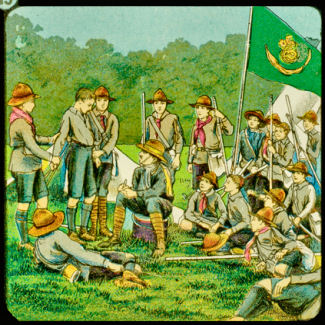 Our friend in the picture has been caught and brought into camp, and he has
quite forgotten that point of Scout law to smile "under all circumstances. "
The chap on the right is doing it to perfection. The despatch-runner was
sent out to take a note to a well-known spot-the post-office in the
neighbouring town. He was to get the note stamped with the post-mark of the
office and return. The rest of the Scouts were posted by their leader to
prevent him getting there by watching all the roads and likely paths by
which he could come, but none were nearer to the post-office' than 200
yards. The despatch-runner was allowed to use any disguise he thought fit,
or to slip through in a cart or waggon if he could get a friendly driver to
give him a lift. But the poor chap couldn't manage the job : he has been
captured. Let's hope they won't shoot him!
Our friend in the picture has been caught and brought into camp, and he has
quite forgotten that point of Scout law to smile "under all circumstances. "
The chap on the right is doing it to perfection. The despatch-runner was
sent out to take a note to a well-known spot-the post-office in the
neighbouring town. He was to get the note stamped with the post-mark of the
office and return. The rest of the Scouts were posted by their leader to
prevent him getting there by watching all the roads and likely paths by
which he could come, but none were nearer to the post-office' than 200
yards. The despatch-runner was allowed to use any disguise he thought fit,
or to slip through in a cart or waggon if he could get a friendly driver to
give him a lift. But the poor chap couldn't manage the job : he has been
captured. Let's hope they won't shoot him! |
|
20. A Bivouac.
Here is a jolly little scene of Scout life-a bivouac in the woods; indeed,
our friends look so comfortable, and have got such a capital but to shelter
in, that we think they can't do better
than turn their bivouac into a permanent camp. They'll have a splendid
opportunity for studying one branch of the Scout's training,
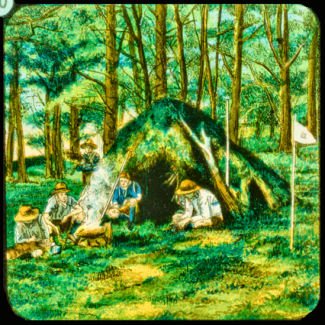 "woodcraft," - the knowledge of nature and of animals. The Scout should be a
lover of animals, it's one of the articles of Scout Law: "A Scout is a
friend of animals. He should save them as far as possible from pain, and
should not kill any animal unnecessarily, even if it is only a fly, for it
is one of God's creatures." Gen. Baden-Powell is a true Scout in this
respect; he believes in keeping pets, and tells how he himself caught and
kept a young wild boar and a young panther, and found them "most amusing and
interesting little beggars. "The boar used to live in the General's garden,
and never became really tame, though caught as a baby. He would come to his
master when called - but very warily; but a stranger or a native he would
"go for" and cut him with his little tusks. He used to practise the use of
his tusks on an old tree stump in the garden, and he would gallop at this
and round it in a figure of eight continuously for five minutes at a time,
and then fling himself down on his side, panting with his exertions. The
panther was a beautiful and delightfully playful beast, and used to go about
with the General like a dog; but he was very uncertain in his dealings with
strangers.
"woodcraft," - the knowledge of nature and of animals. The Scout should be a
lover of animals, it's one of the articles of Scout Law: "A Scout is a
friend of animals. He should save them as far as possible from pain, and
should not kill any animal unnecessarily, even if it is only a fly, for it
is one of God's creatures." Gen. Baden-Powell is a true Scout in this
respect; he believes in keeping pets, and tells how he himself caught and
kept a young wild boar and a young panther, and found them "most amusing and
interesting little beggars. "The boar used to live in the General's garden,
and never became really tame, though caught as a baby. He would come to his
master when called - but very warily; but a stranger or a native he would
"go for" and cut him with his little tusks. He used to practise the use of
his tusks on an old tree stump in the garden, and he would gallop at this
and round it in a figure of eight continuously for five minutes at a time,
and then fling himself down on his side, panting with his exertions. The
panther was a beautiful and delightfully playful beast, and used to go about
with the General like a dog; but he was very uncertain in his dealings with
strangers.
|
|
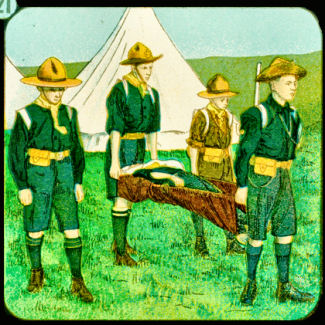 21.
An Injured Comrade. One of the great objects of the Boy Scout movement
is to revive something of that fine spirit of chivalry which we associate
with the knights of old, and which is only too often lacking in the selfish
scramble of our modern life. And so it is one of the most important articles
of Scout Law, that "it is a Scout's duty to be useful and to help others.
And he is to do his duty before anything else, even though he gives up his
own pleasure, or comfort, or safety to do it. When in difficulty to know
which of two things to do, he must ask himself, 'Which is my duty?' that
is, 'Which is best for other people?' - and do that one. He must be prepared
at any time to save life, or to help injured persons. And he must do a good
turn to somebody every day." Accidents will happen sometimes among the
Scouts themselves, and it's a good thing to be able to help an injured
comrade; but the Scout is expected to do a great deal more than this, and is
taught systematically how to render aid in accidents from fire, or panics,
or run-a-way horses, to save life from drowning, and so on. 21.
An Injured Comrade. One of the great objects of the Boy Scout movement
is to revive something of that fine spirit of chivalry which we associate
with the knights of old, and which is only too often lacking in the selfish
scramble of our modern life. And so it is one of the most important articles
of Scout Law, that "it is a Scout's duty to be useful and to help others.
And he is to do his duty before anything else, even though he gives up his
own pleasure, or comfort, or safety to do it. When in difficulty to know
which of two things to do, he must ask himself, 'Which is my duty?' that
is, 'Which is best for other people?' - and do that one. He must be prepared
at any time to save life, or to help injured persons. And he must do a good
turn to somebody every day." Accidents will happen sometimes among the
Scouts themselves, and it's a good thing to be able to help an injured
comrade; but the Scout is expected to do a great deal more than this, and is
taught systematically how to render aid in accidents from fire, or panics,
or run-a-way horses, to save life from drowning, and so on. |
|
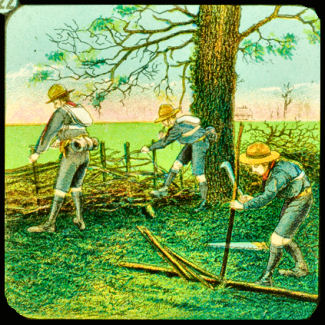 22. "Good Turns":
The Farmer's Hedge - But serious accidents do not happen
every clay, thank heaven, and the obligation to do "a good turn" every clay
is one of the obligations of the Scout law of chivalry. The Scout is to tie
a knot in his necktie to remind him of this duty, and the knot forms a
portion of the badge worn by every Scout. It need not be a great thing that
he is to do. For instance, one thing that he can do is to mend the farmer's
hedge. He is constantly indebted to the farmer for his kindness in letting
him have the run of his fields or woodlands. Let him return the kindness in
this way. 22. "Good Turns":
The Farmer's Hedge - But serious accidents do not happen
every clay, thank heaven, and the obligation to do "a good turn" every clay
is one of the obligations of the Scout law of chivalry. The Scout is to tie
a knot in his necktie to remind him of this duty, and the knot forms a
portion of the badge worn by every Scout. It need not be a great thing that
he is to do. For instance, one thing that he can do is to mend the farmer's
hedge. He is constantly indebted to the farmer for his kindness in letting
him have the run of his fields or woodlands. Let him return the kindness in
this way. |
|
23. Firewood for the Cottager. --Again, "the Scout is to be courteous,
that is, to be polite to all, but especially to women and
children, and old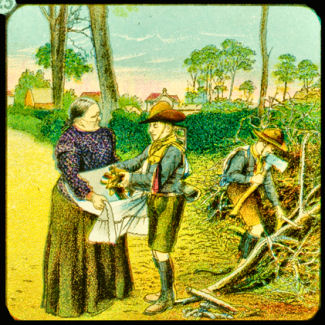 people and invalids, cripples, &c. And he must not take
any reward for being helpful or courteous." So our young Scouts find another
opening for doing a good turn to the old lady who lives in the cottage
yonder by helping her to get an apronful of firewood to boil her kettle.
General Baden-Powell, you'll note, does not believe in the system of "tipping." Here
is one of his little stories: "The other day I saw a boy
help a lady out of a carriage, and as he shut the door after her she turned
to give him some money, but he touched his cap, and smilingly said, "No,
thank you, marm; it's my duty," and walked off. So I shook hands with him, for I felt that
though he had not been taught, he was a Scout by nature."
people and invalids, cripples, &c. And he must not take
any reward for being helpful or courteous." So our young Scouts find another
opening for doing a good turn to the old lady who lives in the cottage
yonder by helping her to get an apronful of firewood to boil her kettle.
General Baden-Powell, you'll note, does not believe in the system of "tipping." Here
is one of his little stories: "The other day I saw a boy
help a lady out of a carriage, and as he shut the door after her she turned
to give him some money, but he touched his cap, and smilingly said, "No,
thank you, marm; it's my duty," and walked off. So I shook hands with him, for I felt that
though he had not been taught, he was a Scout by nature." |
|
|
Lantaarnplaten op deze pagina:
The Boy Scouts: Junior
Lecturer series 782/784 Boy Scouts (3 delen: In Camp with Baden Powell -
Campaigning - Scout Law and Chivalry). Originele bijgesloten teksten. |
24. An
Up-Hill Job: Lending a Hand - Here's another
chance for you. This old man has got an up-hill job. The harrow is heavy.
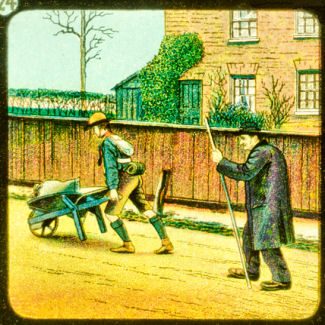 Wheel it up the hill for him, and lend him your pole meanwhile to help him along.
These are some of the little things the Scout may do by way of a good turn;
there are plenty of others, if you'll only look out for them. "If it is
only to put a halfpenny into a poor box, or to help an old woman to cross
the street, or to make room on a seat for someone, or to give water to a
thirsty horse, or to remove a bit of banana skin off the pavement where it
is likely to throw people down, it is a good turn. But one must be done
every day, and it only counts as a good turn when you do not accept any
reward in return." And so, in conclusion, I think we may all very heartily
wish success to General Baden-Powell and his Boy Scouts, for really we
cannot do better than adopt their motto to "Be prepared" always to answer
the call of duty, and their rule of conduct : one good turn every day.
Wheel it up the hill for him, and lend him your pole meanwhile to help him along.
These are some of the little things the Scout may do by way of a good turn;
there are plenty of others, if you'll only look out for them. "If it is
only to put a halfpenny into a poor box, or to help an old woman to cross
the street, or to make room on a seat for someone, or to give water to a
thirsty horse, or to remove a bit of banana skin off the pavement where it
is likely to throw people down, it is a good turn. But one must be done
every day, and it only counts as a good turn when you do not accept any
reward in return." And so, in conclusion, I think we may all very heartily
wish success to General Baden-Powell and his Boy Scouts, for really we
cannot do better than adopt their motto to "Be prepared" always to answer
the call of duty, and their rule of conduct : one good turn every day. |
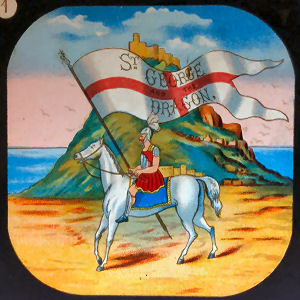 |
Hoewel er eigenlijk niets
over het leven en de daden van Saint
George (Sint Joris) vaststaat, werden de legendes over hem erg populair
en ook steeds onwaarschijnlijker. De padvinderij gebruikt het verhaal waarin
hij een Libische koningsdochter uit de klauwen van een draak redt, waarna
hij het monster doodt, in ruil voor de belofte van de onderdanen van de
koning dat zij zich zullen laten dopen. Het is een thema dat in veel
kunstwerken wordt afgebeeld; de heilige wordt dan meestal neergezet als een
jonge man in een wapenuitrusting die versierd is met een scharlakenrood
kruis. Saint George werd het toonbeeld van krijgshaftigheid, moed en onbaatzuchtigheid. Hij is de patroonheilige van Engeland. De gedenkdag is op 23 april. Klik hier wanneer u de volledige set van twaalf lantaarnplaten wilt zien. |
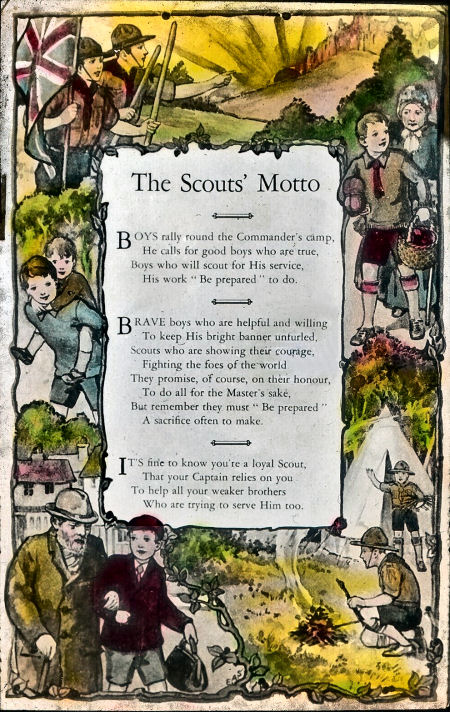 |
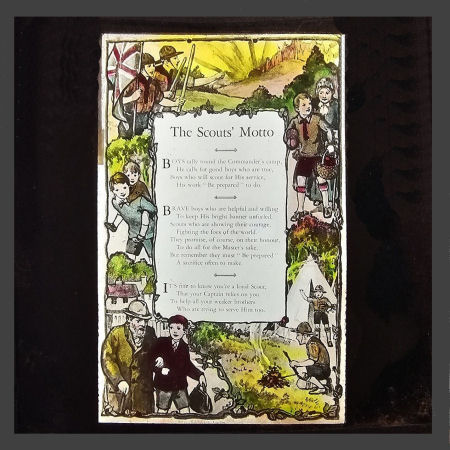 Vierkante toverlantaarnplaat 8,2 x 8,2 cm met The Scouts' Motto. Illustraties rond de tekst benadrukken vooral de eigenschap 'helpful'. Hulp aan bejaarden en jongeren. De fabrikant van deze plaat is onbekend. |
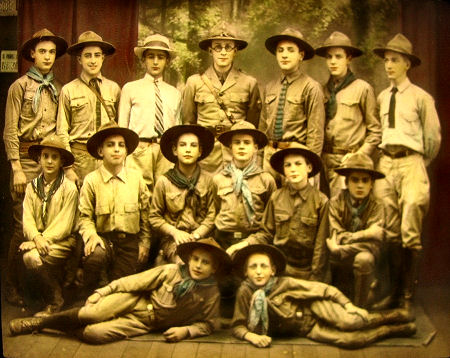 |
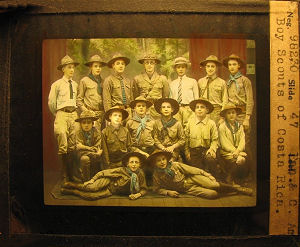  Padvinders van Costa Rica. |
| |
©1997-2024 'de Luikerwaal' Alle rechten voorbehouden. Bijgewerkt tot 31-12-2024. |
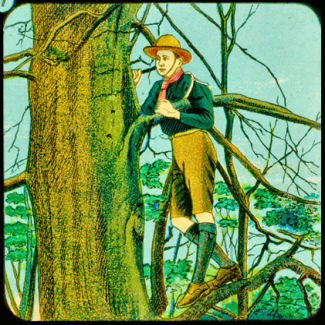 Chapter III. - SCOUT LAW AND CHIVALRY.
Chapter III. - SCOUT LAW AND CHIVALRY.